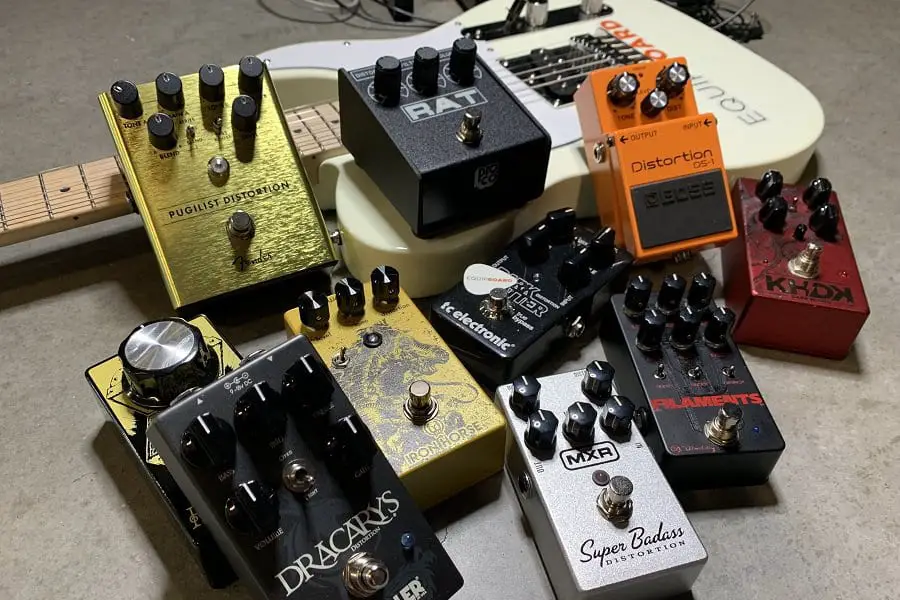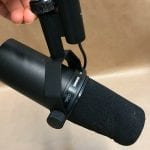Are you looking for the best vocal effects pedals and vocal processors for live performance and recording in 2021?
If you are, welcome to Sustain Punch, and let’s get started!
What exactly are vocal effects pedals?
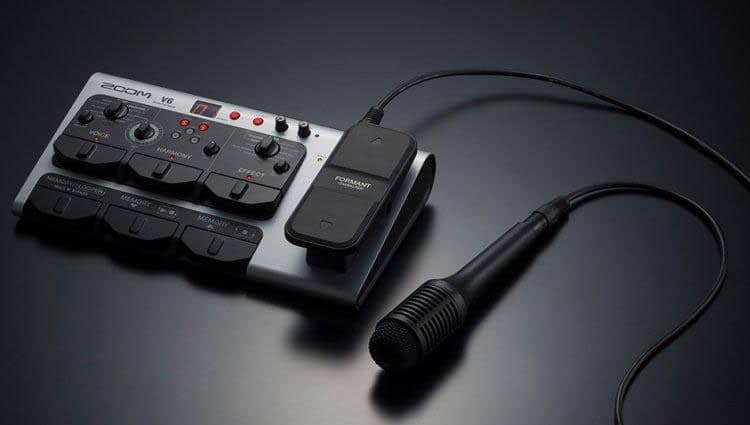
Firstly, for people who are new to using vocal effects processors, let’s talk about what exactly they are and how they are used.
Vocal effects pedals are electronic devices used in both a live and studio environment to enhance a lead or backing vocal with an underlying vocal effect, this could be Reverb, Delay, Echo Flange, EQ, Low-Pass Filter, Pitch Correction/Autotune, etc.
These effects are often used by artists, live on stage, to emulate the studio-version of a particular song.
Although vocal effects processors are used in a studio environment, to add an effect to an existing vocal take, they are more often used in a live performance environment.
Being a singer myself, I realize that other singers will have different vocal requirements for what they want in a vocal processor.
So this article will focus on the best vocal processors that offer singers multiple features/effects in a single stompbox. So you can get the most usability for your buck!
These are called vocal multi-effects pedals.
Therefore, if you are looking for a pedal that only offers a specific feature, please take a look at the following articles featured below, otherwise, enjoy! 😀
- vocal looper pedals & vocal loop processors
- vocal autotune pedal & pitch-correction processors
- autotune microphones
- vocal reverb pedals
- vocal delay pedals
- vocal distortion pedals
- vocal echo processor
- vocal compressor pedals
- vocal harmonizer pedal
Who requires a Vocal Effects Processor?
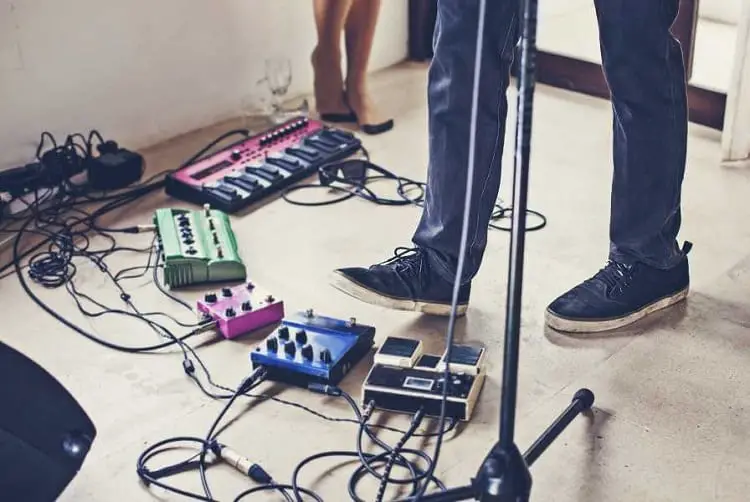
Any vocalist who performs on-stage and is looking to improve the overall sound of their vocal performance would find a vocal effects processor useful.
Some people, mainly ‘vocal purists’, may not look kindly on the use of vocal effects pedals that digitally alter the sound of a singer’s natural voice; and although such artists who have built a career on heavy use of vocal effects I.E Cher, T-Pain would disagree with this opinion, it’s certainly clear that other instrument players are not criticized with the use of live digital enhancement, making the point against singers using vocal effects processors quite irrelevant and somewhat short-sighted.
An example being a guitarist or bassist using effects, i.e bass octave pedals or a guitar eq pedal
Now, I can understand the point that some people make, about wanting to see a live performance of a vocalist, and not want to hear the equivalent of a robot singing on-stage.
But what people fail to realize is that all vocal effects can be controlled, monitored and limited, and therefore subtle use of these effects can have dramatic effects on the vocal performance; making it sound utterly natural.
Perhaps you’re looking at vocal effects processors because you naturally sing slightly flat/sharp in places and want to have a subtle amount of pitch correction, alongside some enhancements such as EQ and Limiting.
Although you can train to improve your pitch accuracy and vocal tone over a period of time, there will always be fluctuations in your vocal performances, and this is felt by new singers to experienced singers.
Therefore incorporating a vocal effects processor can limit the unpredictable nature of the voice, giving you some reassurance that you will be able to iron out some of the minor mistakes within a performance because after all, you want to give the audience a fantastic performance.
Features of vocal effects pedals/processors
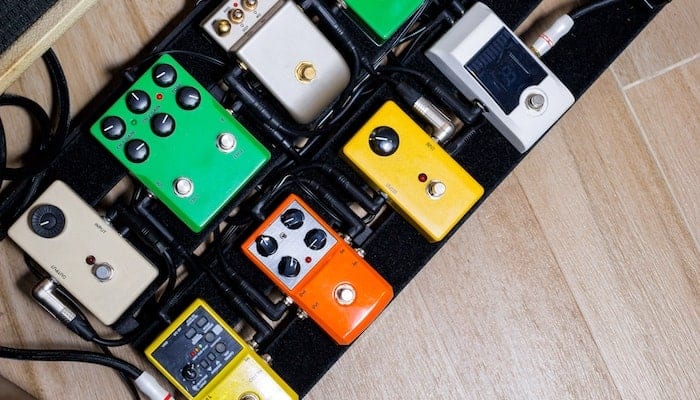
There are a variety of different vocal effects processors available on the market; Some of these pedals have specific single uses, an example being vocal looper pedals, vocal autotune pedals, etc.
Other vocal effects processors have a range of vocal effects integrated within the same physical unit. Because of this, the unit is slightly more expensive than if all of the aforementioned effects were purchased separately.
Some of the more commonly used vocal effects include:
- Harmony – Providing 1-2 additional vocal harmonies above/below the main inputted signal
- Looping – Providing a looped reiteration of the inputted signal until turned off
- Dedicated inputs/outputs for external instruments which will be plugged in – This is an additional feature and is especially useful for singers who also play guitar
- Pitch correction – Providing a frequency nudge of the inputted signal, depending on whether it’s slightly sharp or flat
- There are other vocal effects to choose from, there include, vocal delay, reverb, echo, doubling, chorus, etc.
Vocal Effects Pedals for Live Performances and Studio Recording
Vocal effects processors are a great solution for singers looking to have one pedal on stage or in-studio.
A common mistake that singers make, who might not necessarily know much about vocal effects pedals, is that they don’t spend enough money on one…
Remember, this single vocal effects unit will save you the job of having to purchase:
- separate pedals,
- a pedal-board,
- an external power supply and
- plenty of 1/4 inch jack leads to inter-link these processors
All of this equipment would cost hundreds and hundreds to purchase…
So it’s worth making a decent initial investment into a vocal multi-effects pedal, (this is only if you’re looking at having multiple vocal effects in one unit).
Also, each pedal has it’s own unique means of operation, therefore having multiple pedals from different brands would require more effort on the singers part to operate, which isn’t great when you’re in a live environment, trying to give the audience a vocal performance of a lifetime.
For the quick-purchasers out there, we’ve featured all of the top 5 vocal effects pedals.
Best Vocal Effects Pedals Of 2020
Best Vocal-effects processor/pedal for singers without a guitar
TC Helicon Voice Live Play
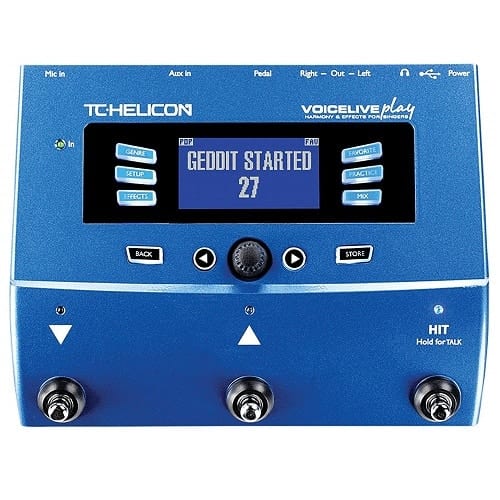
Best Vocal-effects processor/pedal for singers with Electric Guitar
Zoom V3 Vocal Processor EFFECTS PEDAL

Best Vocal-effects processor/pedal for singers with Acoustic Guitar
TC Helicon Play Acoustic Vocal Effects Processor
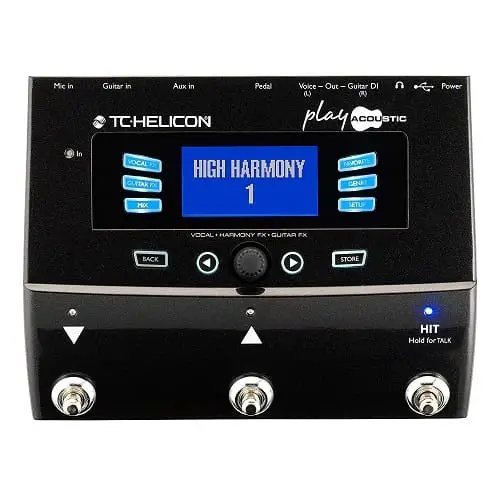
You might be wondering, what exactly is the difference between all of these TC Helicon Play processors.
Well, the core functionality is exactly the same,
- Footpedal
- Roomsense Functionality
- Pitch Correction
- Microphone Control Functionality with MP-75/56 and Sennheiser E 835 FX
- Tap Tempo
- Looping (15/30/60 second intervals)
- Vocal effects (Reverb, Delay, Harmony, Doubling, Hard tune)
However, the pedals differ in their guitar effect functionality, as you can see from the chart below.
VoiceLive Play VoiceLive Play Electric VoiceLive Play Acoustic
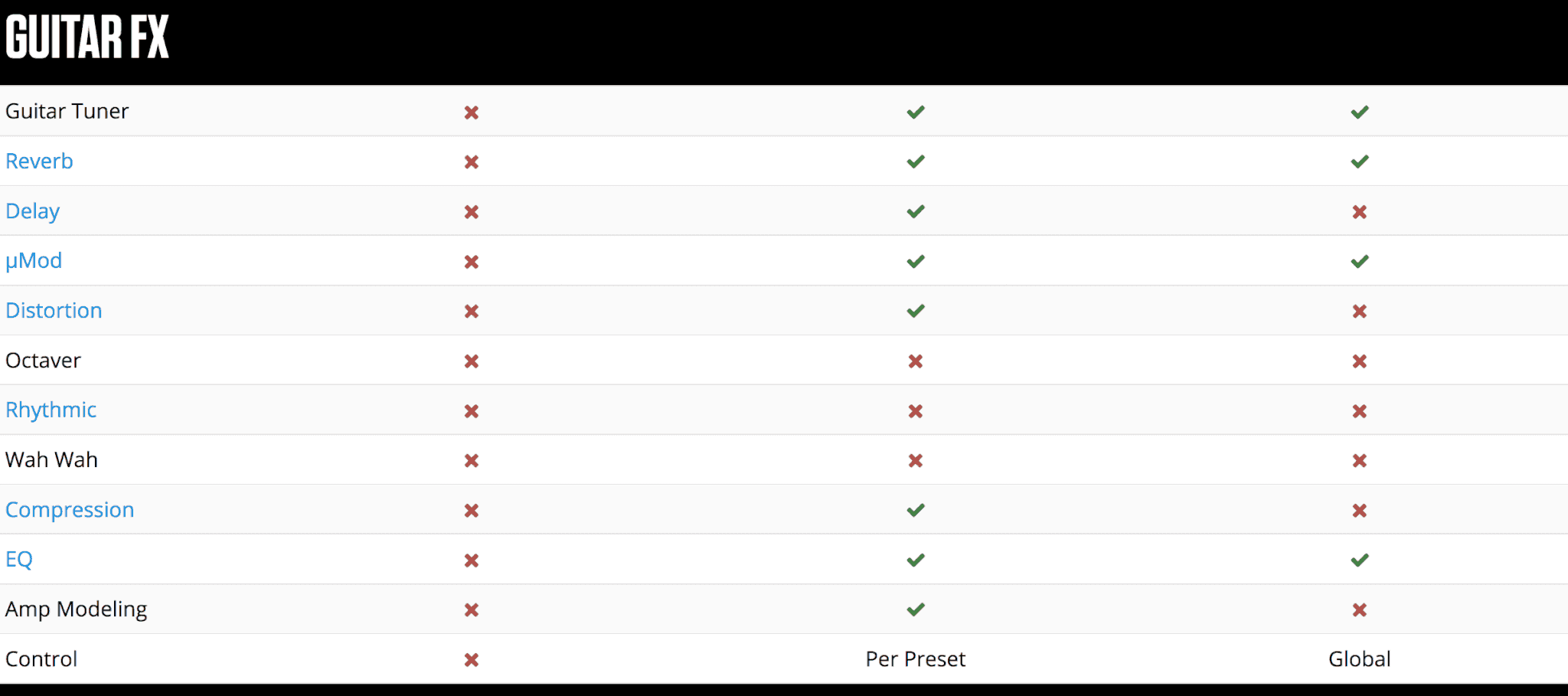
As you can see from the VoiceLive Play, Electric & Acoustic comparison chart. Despite the pedals looking very similar and having an identical core functionality, there is a huge difference in guitar effects functionlity.
Therefore, for singers who play either the electric or acoustic guitar, the VoiceLive Play Electric or VoiceLive Play Acoustic is certainly the most appropriate processor to choose from.
For singers who do not need the added functionality of having an integrated guitar effects processor, I would suggest using the original VoiceLive Play.
Best Vocal-effects processor/pedal for singers
TC-Helicon VoiceLive 3
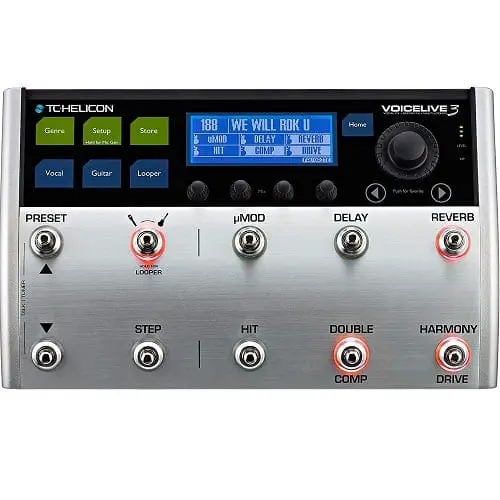
The TC Helicon VoiceLive 3 is the ideal multi-effect vocal solution for singers who are really serious about wanting to incorporate that studio refined sound within their live performance.
The processor has over 500 loaded presets and many more features shown below
- ‘Roomsense’ & ‘Natural Play’ (For effective real-time harmony/pitch correction analysis)
- 45 Minutes Looping time (8 Mins per track limit)
- Midi Synchronization
- Vocal Effects (Reverb, Delay, Harmony, Doubling, Hard tune, Transducer, Umod, Vocoder, and Rhythmic)
- Guitar Functionality (Tuner, Reverb, Delay, Umod, Distortion, Octaver, Rhythmic, Wah-Wah, Compressor, EQ, Amp Modelling, Control per preset)
- 1 XLR in, 2 XLR out, TRS in (Vocals), Instrument In/Thru, Guitar Direct Out, Aux-in, SPDIF, Headphone Out, Exp pedal in.
Now this will be the perfect multi-effects processor for most professional singers.
However, if you’re looking for increased looping time (5 Hours in total – 8 Mins per track limit),
with the capability to play backing tracks, then I would suggest looking at the VoiceLive 3 Extreme.
The only slight downside to the ‘VoiceLive 3 Extreme is that it comes with 250 loaded presets (but has a capacity for 500 – which can be downloaded).
Best Vocal-effects processor/pedal for singers who want backing tracks & more looping time
TC-Helicon VoiceLive 3 Extreme
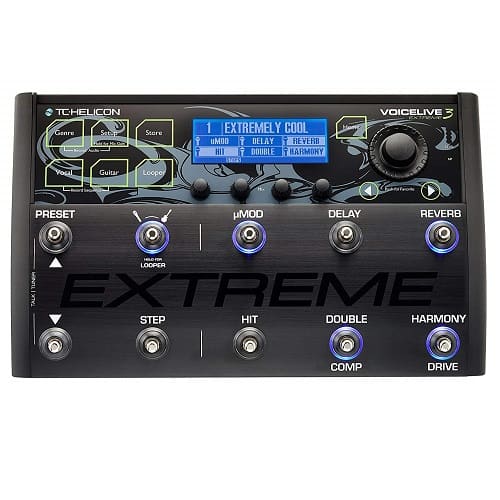
The TC Helicon VoiceLive 3 Extreme is, as the name suggests, an extreme version of the VoiceLive 3, providing even more functionality, including increased looping time (5 Hours in total – 8 Mins per track limit) and the capability to play backing tracks for those who really need it.
- ‘Roomsense’ & ‘Natural Play’ (For effective real-time harmony/pitch correction analysis)
- 5 Hours in total – 8 Mins per track limit
- Backing Tracks
- Midi Synchronization
- Vocal Effects (Loops, Delays, Reverbs, Doubling, Hard tune, Harmonies, Filtering, Gating, Synth/Vocoder emulation, Transducer, Chorus, Flanger and more)
- Guitar Functionality (Tuner, Reverb, Delay, Umod, Distortion, Octaver, Rhythmic, Wah-Wah, Compressor, EQ, Amp Modelling, Control per preset)
- 1 XLR in, 2 XLR out, TRS in (Vocals), Instrument In/Thru, Guitar Direct Out, Aux-in, SPDIF, Headphone Out, Exp pedal in.
For more information about this unit, take a look at our TC Helicon VoiceLive 3 Extreme Review, which includes more information regarding the technical aspects of the product.
Conclusion
We realize that all of these pedals are created by TC Helicon.
That’s no surprise since they are one of the companies leading the way in voice/vocal effects for singers.
The multi-effects vocal solutions we offer are certainly a must for singers looking to transform their performance.
When keeping in mind the sheer amount of effects that each of these processors provides, you really do get a surplus of functionality for the price.
It really is a small price to pay for such a large sounding difference, suitable for the professional singer/songwriter.Save


